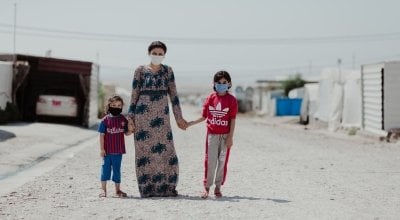
Knowledge Hub
Refugees – busting the myths

You only have to pick up a newspaper or look at social media to see there are a lot of misconceptions about refugees out there, and sadly, many of them are negative. So, during Refugee Week (16-23rd June), we thought we’d take the opportunity to explore, and try to correct, the most common myths.
Although many people think that the UK takes in hundreds of thousands of refugees every year, the reality is that poor countries – not the UK – take in and look after most of the world's refugees.
According to the United Nations High Commissioner for Refugees (UNHCR), by the end of 2017 there were 121,837 refugees and 40,365 pending asylum cases in the UK. That's around one quarter of a percent (0.25%) of the UK's total population. Of all the EU countries, Germany actually has the largest refugee population, at 1.4 million.
There are more than 68.5 million forcibly displaced people worldwide, and the vast majority (about 85%) of the world’s refugees live in developing countries, often in camps or in poor accommodation, in places like Turkey, Lebanon, Uganda and Pakistan. (UNHCR)

Over 5.6 million people have fled conflict in Syria since the war began in 2011, and many more are displaced inside the country. Turkey is the biggest refugee hosting country in the world, with over 3.5 million registered Syrian refugees (UNHCR).
Lebanon, which actually has a population of just over seven million, hosts around one million Syrian refugees. In fact in 2017, one in six people in Lebanon was a refugee. (Refugee Council, 2018).
The UK does provide aid to the refugee camps on Syria’s borders, but we currently accept less than half of our calculated ‘fair share’ of Syrian refugees (based on economy size), and by the end of 2018, the UK had resettled 13,961 Syrian refugees (Refugee Council, 2018). It has pledged to resettle a total of 20,000 Syrians by 2020 through the Vulnerable Persons Resettlement Scheme.
So let’s bust another myth – the one that says people seek refugee status for economic reasons. Actually, most people are fleeing because they are looking for a place of safety. The countries which produce the most refugees like Syria, Afghanistan, South Sudan and Myanmar for example, all have ongoing conflict, or poor human rights records. In the UK at least, asylum seekers and refugees do not get large handouts from the state. Most asylum seekers are not allowed to work and are forced to rely on state support – which can be as little as £5 a day to live on. (Refugee Council, 2018). Refugees are not the same as economic migrants. Refugees are fleeing their homes because they are in fear for their lives.

As well as working with displaced people in Syria, Concern works with Syrian refugees in Lebanon and through partners in Turkey and Jordan. We also work with refugees and displaced people in South Sudan, the Democratic Republic of Congo and Bangladesh. The support we provide can range from helping to provide shelter to Syrian families in Lebanon, emergency food and healthcare to Syrian refugees in Jordan, or emergency nutrition for mothers and babies who have fled Myanmar to the refugee camps in neighbouring Bangladesh.
During Refugee Week, we are asking people to show their solidarity with refugees by taking part in the Ration Challenge - eating the same rations as a Syrian refugee living in a camp in Jordan and getting sponsored to do so. The money raised goes directly to providing food rations, medical care, education and other essential support to Syrian refugees living in Jordan, and helps other people living in extreme poverty around the world. The Ration Challenge helps people in urgent need as well as tackling the root cause of injustice through our emergency response, long-term development and advocacy programmes.






